莫言诺贝尔文学奖致辞英文演讲稿
- 格式:docx
- 大小:45.90 KB
- 文档页数:41
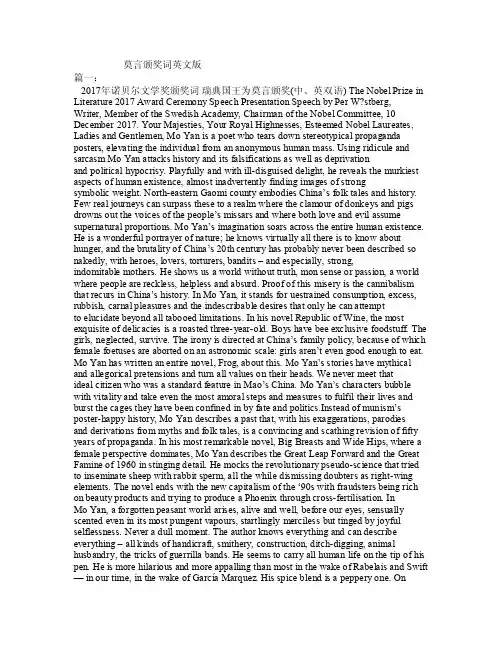
莫言颁奖词英文版篇一:2017年诺贝尔文学奖颁奖词瑞典国王为莫言颁奖(中、英双语) The Nobe l Pri ze in Lite ratur e 2017 Awa rd Ce remon y Spe ech P resen tatio n Spe ech b y Per W?st berg,Writ er, M ember of t he Sw edish Acad emy,Chair man o f the Nobe l Com mitte e, 10Dece mber2017. Your Maje sties, You r Roy al Hi ghnes ses,Estee med N obelLaure ates, Ladi es an d Gen tleme n, Mo Yanis apoetwho t earsdownstere otypi cal p ropag andaposte rs, e levat ing t he in divid ual f rom a n ano nymou s hum an ma ss. U singridic ule a ndsa rcasm Mo Y an at tacks hist ory a nd it s fal sific ation s aswellas de priva tionand p oliti cal h ypocr isy.Playf ullyand w ith i ll-di sguis ed de light, herevea ls th e mur kiest aspe cts o f hum an ex isten ce, a lmost inad verte ntlyfindi ng im agesof st rongsymbo lic w eight. Nor th-ea stern Gaom i cou nty e mbodi es Ch ina’s folk tale s and hist ory.Few r eal j ourne ys ca n sur passthese to a real m whe re th e cla mourof do nkeys andpigsdrown s out thevoice s ofthe p eople’s mi ssars andwhere both love andevilassum esup ernat uralpropo rtion s. Mo Yan’s ima ginat ion s oarsacros s the enti re hu man e xiste nce.He is a wo nderf ul po rtray er of natu re; h e kno ws vi rtual ly al l the re is to k now a bouthunge r, an d the brut ality of C hina’s 20t h cen turyhas p robab ly ne ver b een d escri bed s o nak edly, with hero es, l overs, tor turer s, ba ndits– an d esp ecial ly, s trong,ind omita ble m other s. He show s usa wor ld wi thout trut h, mo n sen se or pass ion,a wor ld wh ere p eople arereckl ess,helpl ess a nd ab surd. Proo f ofthismiser y isthe c annib alism that recu rs in Chin a’s h istor y. In Mo Y an, i t sta nds f or ue strai ned c onsum ption, exc ess,rubbi sh, c arnal plea sures andthe i ndesc ribab le de sires that only he c an at temptto e lucid ate b eyond alltaboo ed li mitat ions. In h is no vel R epubl ic of Wine, the mostexqu isite of d elica ciesis aroast ed th ree-y ear-o ld. B oys h ave b ee ex clusi ve fo odstu ff. T he gi rls,negle cted, surv ive.The i ronyis di recte d atChina’s fa milypolic y, be cause of w hichfemal e foe tuses areabort ed on an a stron omicscale: gir ls ar en’tevengoodenoug h toeat.Mo Ya n has writ ten a n ent ire n ovel, Frog, abo ut th is. M o Yan’s st ories have myth icaland a llego rical pret ensio ns an d tur n all valu es on thei r hea ds. W e nev er me et th atid eal c itize n who wasa sta ndard feat ure i n Mao’s Ch ina.Mo Ya n’s c harac tersbubbl ewit h vit ality andtakeeventhe m ost a moral step s and meas uresto fu lfiltheir live s and burs t the cage s the y hav e bee n con fined in b y fat e and poli tics.Inste ad of muni sm’sposte r-hap py hi story, MoYan d escri bes a past that, wit h his exag gerat ions, paro diesand d eriva tions from myth s and folk tale s, is a co nvinc ing a nd sc athin g rev ision of f iftyyears of p ropag anda. In h is mo st re marka ble n ovel, BigBreas ts an d Wid e Hip s, wh ere a fema le pe rspec tivedomin ates, Mo Y an de scrib es th e Gre at Le ap Fo rward andthe G reatFamin e of1960in st ingin g det ail.He mo cks t he re volut ionar y pse udo-s cienc e tha t tri ed to inse minat e she ep wi th ra bbitsperm, all thewhile dism issin g dou bters as r ight-wingeleme nts.The n ovelendswiththe n ew ca pital ism o f the ‘90s with frau dster s bei ng ri ch on beau ty pr oduct s and tryi ng to prod uce a Phoe nix t hroug h cro ss-fe rtili satio n. InMo Y an, a forg otten peas ant w orldarise s, al ive a nd we ll, b efore oureyes, sens uallyscen ted e ven i n its most pung ent v apour s, st artli nglymerci lessbut t inged by j oyfulself lessn ess.Never a du ll mo ment. Theautho r kno ws ev eryth ing a nd ca n des cribeever ythin g –a ll ki nds o f han dicra ft, s mithe ry, c onstr uctio n, di tch-d iggin g, an imalhusba ndry, thetrick s ofguerr illabands. Heseems to c arryall h umanlifeon th e tip of h is pe n. He is m ore h ilari ous a nd mo re ap palli ng th an mo st in thewakeof Ra belai s and Swif t —i n our time, inthe w ake o f Gar cía M arque z. Hi s spi ce bl end i s a p epper y one. Onhis b roadtapes try o f Chi na’slasthundr ed ye ars,there areneith er da ncing unic ornsnor s kippi ng ma idens. But he p aints life in a pigs ty in such a wa y tha t wefeelwe ha vebe en th ere f ar to o lon g. Id eolog ies a nd re formmovem entsmay e andgo bu t hum aneg oismand g reedremai n. So Mo Y an de fends smal l ind ividu als a gains t all inju stice s –f rom J apane se oc cupat ion t o Mao ist t error andtoday’s pr oduct ion f renzy. For thos e who vent ure t o MoYan’s home dist rict, wher e bou ntifu l vir tue b attle s the vile st cr uelty,a s tagge ringliter ary a dvent ure a waits. Has ever such an e pic s pring floo d eng ulfed Chin a and therestof th e wor ld? I n MoYan’s work, wor ld li terat ure s peaks with avo ice t hat d rowns outmostconte mpora ries. TheSwedi sh Ac ademy cong ratul atesyou.I cal l onyou t o acc ept t he 2017 No bel P rizefor L itera turefromthe h and o f HisMaje sty t he Ki ng. 2017年诺贝尔文学奖颁奖词瑞典国王为莫言颁奖(中、英双语)北京时间12月11日0时16分许,2017年诺贝尔奖颁奖仪式在瑞典斯德哥尔摩隆重举行。
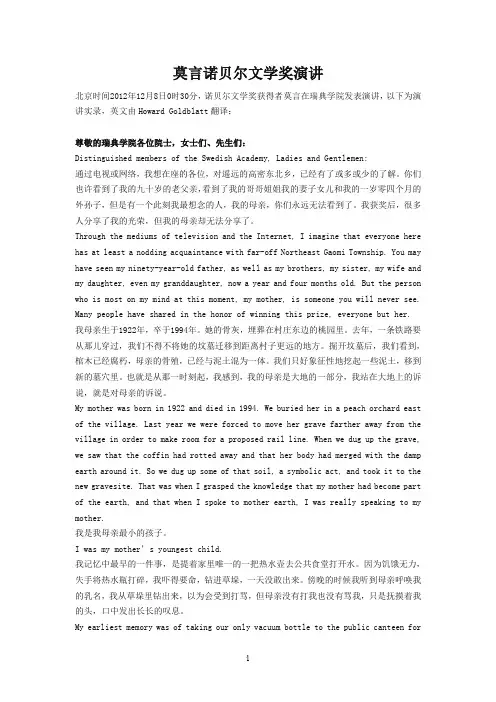
莫言诺贝尔文学奖演讲北京时间2012年12月8日0时30分,诺贝尔文学奖获得者莫言在瑞典学院发表演讲,以下为演讲实录,英文由Howard Goldblatt翻译:尊敬的瑞典学院各位院士,女士们、先生们:Distinguished members of the Swedish Academy, Ladies and Gentlemen:通过电视或网络,我想在座的各位,对遥远的高密东北乡,已经有了或多或少的了解。
你们也许看到了我的九十岁的老父亲,看到了我的哥哥姐姐我的妻子女儿和我的一岁零四个月的外孙子,但是有一个此刻我最想念的人,我的母亲,你们永远无法看到了。
我获奖后,很多人分享了我的光荣,但我的母亲却无法分享了。
Through the mediums of television and the Internet, I imagine that everyone here has at least a nodding acquaintance with far-off Northeast Gaomi Township. You may have seen my ninety-year-old father, as well as my brothers, my sister, my wife and my daughter, even my granddaughter, now a year and four months old. But the person who is most on my mind at this moment, my mother, is someone you will never see. Many people have shared in the honor of winning this prize, everyone but her. 我母亲生于1922年,卒于1994年。
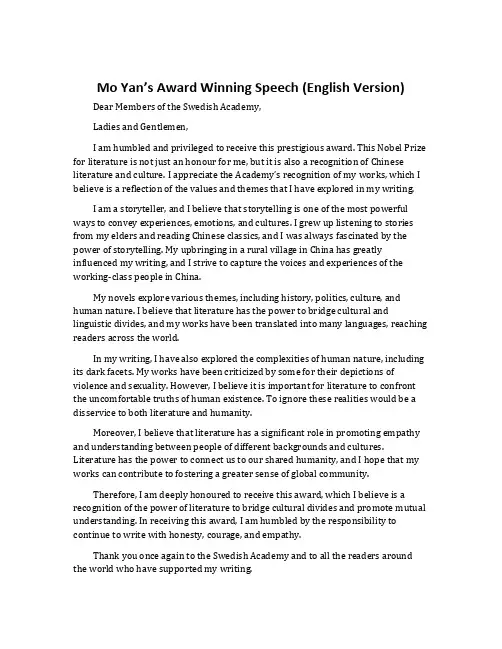
Mo Yan’s Award Winning Speech (English Version)Dear Members of the Swedish Academy,Ladies and Gentlemen,I am humbled and privileged to receive this prestigious award. This Nobel Prize for literature is not just an honour for me, but it is also a recognition of Chinese literature and culture. I appreciate the Academy’s recognition of my works, which I believe is a reflection of the values and themes that I have explored in my writing.I am a storyteller, and I believe that storytelling is one of the most powerful ways to convey experiences, emotions, and cultures. I grew up listening to stories from my elders and reading Chinese classics, and I was always fascinated by the power of storytelling. My upbringing in a rural village in China has greatly influenced my writing, and I strive to capture the voices and experiences of the working-class people in China.My novels explore various themes, including history, politics, culture, and human nature. I believe that literature has the power to bridge cultural and linguistic divides, and my works have been translated into many languages, reaching readers across the world.In my writing, I have also explored the complexities of human nature, including its dark facets. My works have been criticized by some for their depictions of violence and sexuality. However, I believe it is important for literature to confront the uncomfortable truths of human existence. To ignore these realities would be a disservice to both literature and humanity.Moreover, I believe that literature has a significant role in promoting empathy and understanding between people of different backgrounds and cultures. Literature has the power to connect us to our shared humanity, and I hope that my works can contribute to fostering a greater sense of global community.Therefore, I am deeply honoured to receive this award, which I believe is a recognition of the power of literature to bridge cultural divides and promote mutual understanding. In receiving this award, I am humbled by the responsibility to continue to write with honesty, courage, and empathy.Thank you once again to the Swedish Academy and to all the readers around the world who have supported my writing.。
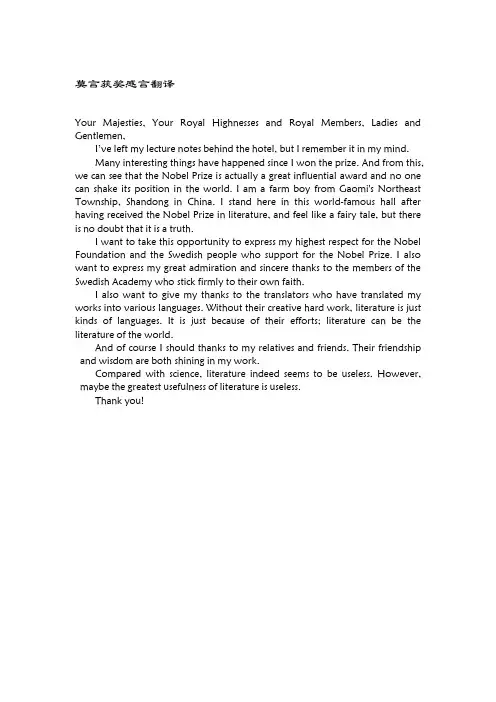
莫言获奖感言翻译Your Majesties, Your Royal Highnesses and Royal Members, Ladies and Gentlemen,I’ve left my lecture notes behind the hotel, but I remember it in my mind.Many interesting things have happened since I won the prize. And from this, we can see that the Nobel Prize is actually a great influential award and no one can shake its position in the world. I am a farm boy from Gaomi's Northeast Township, Shandong in China. I stand here in this world-famous hall after having received the Nobel Prize in literature, and feel like a fairy tale, but there is no doubt that it is a truth.I want to take this opportunity to express my highest respect for the Nobel Foundation and the Swedish people who support for the Nobel Prize. I also want to express my great admiration and sincere thanks to the members of the Swedish Academy who stick firmly to their own faith.I also want to give my thanks to the translators who have translated my works into various languages. Without their creative hard work, literature is just kinds of languages. It is just because of their efforts; literature can be the literature of the world.And of course I should thanks to my relatives and friends. Their friendship and wisdom are both shining in my work.Compared with science, literature indeed seems to be useless. However, maybe the greatest usefulness of literature is useless.Thank you!。
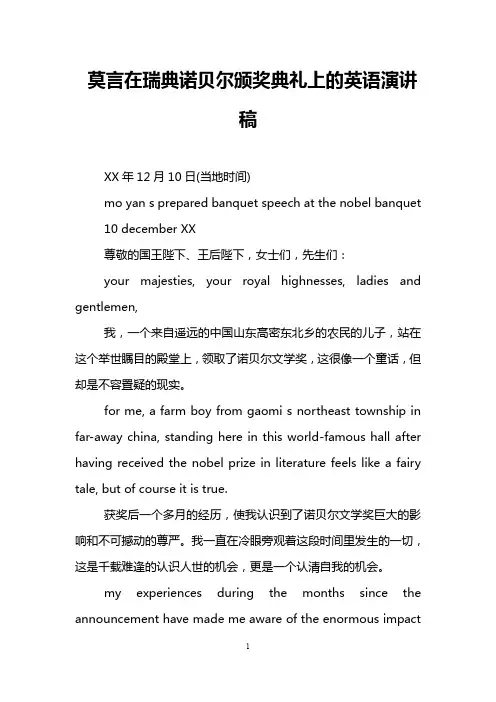
莫言在瑞典诺贝尔颁奖典礼上的英语演讲稿XX年12月10日(当地时间)mo yan s prepared banquet speech at the nobel banquet10 december XX尊敬的国王陛下、王后陛下,女士们,先生们:your majesties, your royal highnesses, ladies and gentlemen,我,一个来自遥远的中国山东高密东北乡的农民的儿子,站在这个举世瞩目的殿堂上,领取了诺贝尔文学奖,这很像一个童话,但却是不容置疑的现实。
for me, a farm boy from gaomi s northeast township in far-away china, standing here in this world-famous hall after having received the nobel prize in literature feels like a fairy tale, but of course it is true.获奖后一个多月的经历,使我认识到了诺贝尔文学奖巨大的影响和不可撼动的尊严。
我一直在冷眼旁观着这段时间里发生的一切,这是千载难逢的认识人世的机会,更是一个认清自我的机会。
my experiences during the months since the announcement have made me aware of the enormous impactof the nobel prize and the unquestionable respect it enjoys. i have tried to view what has happened during this period in a cool, detached way. it has been a golden opportunity for me to learn about the world and, even more so, an opportunity for me to learn about myself.我深知世界上有许多作家有资格甚至比我更有资格获得这个奖项;我相信,只要他们坚持写下去,只要他们相信文学是人的光荣也是上帝赋予人的权利,那么,他必将华冠加在你头上,把荣冕交给你。
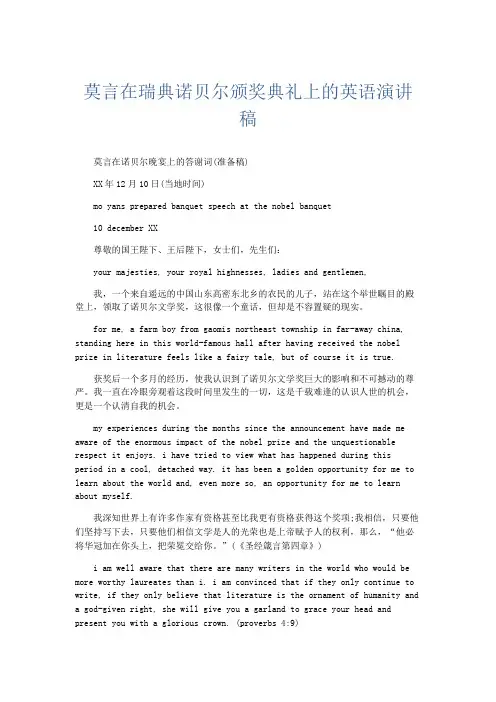
莫言在瑞典诺贝尔颁奖典礼上的英语演讲稿莫言在诺贝尔晚宴上的答谢词(准备稿)XX年12月10日(当地时间)mo yans prepared banquet speech at the nobel banquet10 december XX尊敬的国王陛下、王后陛下,女士们,先生们:your majesties, your royal highnesses, ladies and gentlemen,我,一个来自遥远的中国山东高密东北乡的农民的儿子,站在这个举世瞩目的殿堂上,领取了诺贝尔文学奖,这很像一个童话,但却是不容置疑的现实。
for me, a farm boy from gaomis northeast township in far-away china, standing here in this world-famous hall after having received the nobel prize in literature feels like a fairy tale, but of course it is true.获奖后一个多月的经历,使我认识到了诺贝尔文学奖巨大的影响和不可撼动的尊严。
我一直在冷眼旁观着这段时间里发生的一切,这是千载难逢的认识人世的机会,更是一个认清自我的机会。
my experiences during the months since the announcement have made me aware of the enormous impact of the nobel prize and the unquestionable respect it enjoys. i have tried to view what has happened during this period in a cool, detached way. it has been a golden opportunity for me to learn about the world and, even more so, an opportunity for me to learn about myself.我深知世界上有许多作家有资格甚至比我更有资格获得这个奖项;我相信,只要他们坚持写下去,只要他们相信文学是人的光荣也是上帝赋予人的权利,那么,“他必将华冠加在你头上,把荣冕交给你。
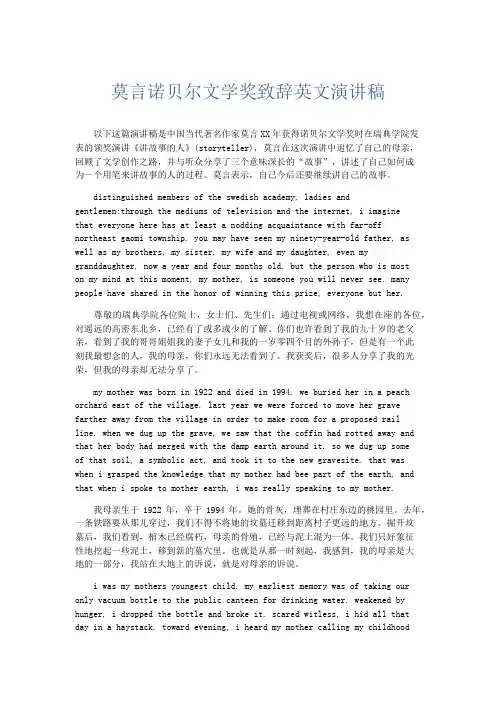
莫言诺贝尔文学奖致辞英文演讲稿以下这篇演讲稿是中国当代著名作家莫言XX年获得诺贝尔文学奖时在瑞典学院发表的领奖演讲《讲故事的人》(storyteller),莫言在这次演讲中追忆了自己的母亲,回顾了文学创作之路,并与听众分享了三个意味深长的“故事”,讲述了自己如何成为一个用笔来讲故事的人的过程。
莫言表示,自己今后还要继续讲自己的故事。
distinguished members of the swedish academy, ladies andgentlemen:through the mediums of television and the internet, i imaginethat everyone here has at least a nodding acquaintance with far-offnortheast gaomi township. you may have seen my ninety-year-old father, as well as my brothers, my sister, my wife and my daughter, even my granddaughter, now a year and four months old. but the person who is moston my mind at this moment, my mother, is someone you will never see. many people have shared in the honor of winning this prize, everyone but her.尊敬的瑞典学院各位院士,女士们、先生们:通过电视或网络,我想在座的各位,对遥远的高密东北乡,已经有了或多或少的了解。
你们也许看到了我的九十岁的老父亲,看到了我的哥哥姐姐我的妻子女儿和我的一岁零四个月的外孙子,但是有一个此刻我最想念的人,我的母亲,你们永远无法看到了。
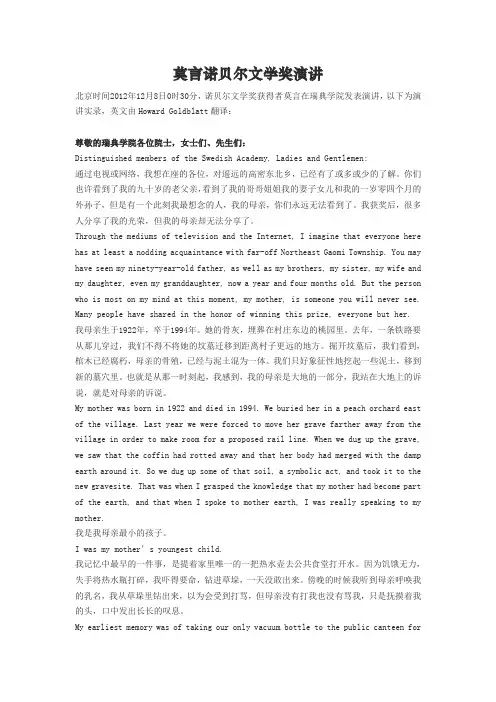
莫言诺贝尔文学奖演讲北京时间2012年12月8日0时30分,诺贝尔文学奖获得者莫言在瑞典学院发表演讲,以下为演讲实录,英文由Howard Goldblatt翻译:尊敬的瑞典学院各位院士,女士们、先生们:Distinguished members of the Swedish Academy, Ladies and Gentlemen:通过电视或网络,我想在座的各位,对遥远的高密东北乡,已经有了或多或少的了解。
你们也许看到了我的九十岁的老父亲,看到了我的哥哥姐姐我的妻子女儿和我的一岁零四个月的外孙子,但是有一个此刻我最想念的人,我的母亲,你们永远无法看到了。
我获奖后,很多人分享了我的光荣,但我的母亲却无法分享了。
Through the mediums of television and the Internet, I imagine that everyone here has at least a nodding acquaintance with far-off Northeast Gaomi Township. You may have seen my ninety-year-old father, as well as my brothers, my sister, my wife and my daughter, even my granddaughter, now a year and four months old. But the person who is most on my mind at this moment, my mother, is someone you will never see. Many people have shared in the honor of winning this prize, everyone but her. 我母亲生于1922年,卒于1994年。
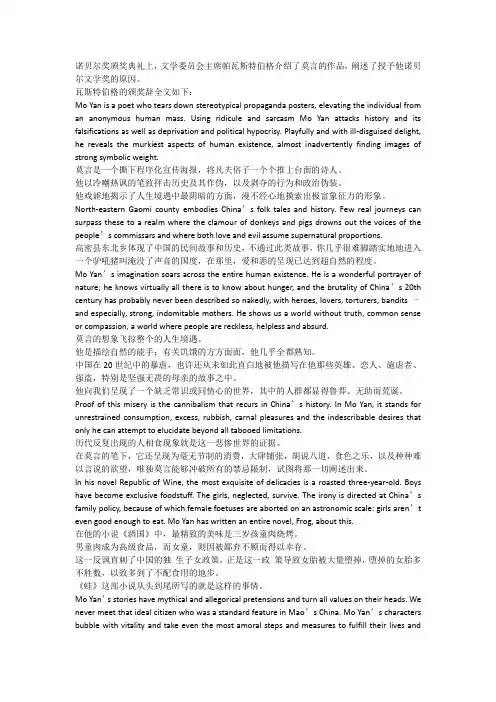
诺贝尔奖颁奖典礼上,文学委员会主席帕瓦斯特伯格介绍了莫言的作品,阐述了授予他诺贝尔文学奖的原因。
瓦斯特伯格的颁奖辞全文如下:Mo Yan is a poet who tears down stereotypical propaganda posters, elevating the individual from an anonymous human mass. Using ridicule and sarcasm Mo Yan attacks history and its falsifications as well as deprivation and political hypocrisy. Playfully and with ill-disguised delight, he reveals the murkiest aspects of human existence, almost inadvertently finding images of strong symbolic weight.莫言是一个撕下程序化宣传海报,将凡夫俗子一个个推上台面的诗人。
他以冷嘲热讽的笔致抨击历史及其作伪,以及剥夺的行为和政治伪装。
他戏谑地揭示了人生境遇中最阴暗的方面,漫不经心地摸索出极富象征力的形象。
North-eastern Gaomi county embodies China’s folk tales and history. Few real journeys can surpass these to a realm where the clamour of donkeys and pigs drowns out the voices of the people’s commissars and where both love and evil assume supernatural proportions.高密县东北乡体现了中国的民间故事和历史,不通过此类故事,你几乎很难脚踏实地地进入一个驴吼猪叫淹没了声音的国度,在那里,爱和恶的呈现已达到超自然的程度。
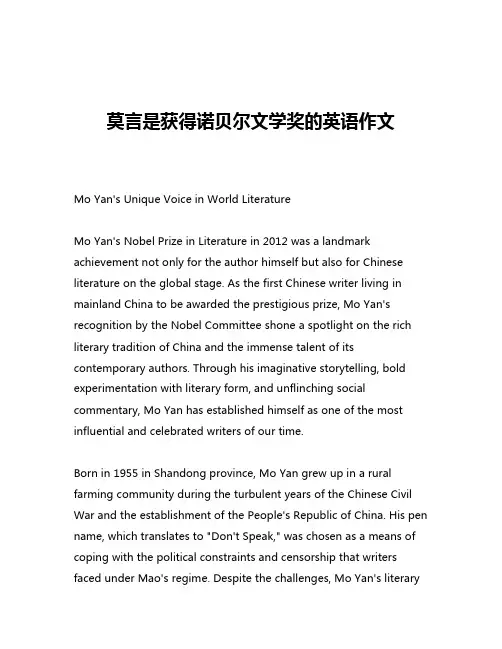
莫言是获得诺贝尔文学奖的英语作文Mo Yan's Unique Voice in World LiteratureMo Yan's Nobel Prize in Literature in 2012 was a landmark achievement not only for the author himself but also for Chinese literature on the global stage. As the first Chinese writer living in mainland China to be awarded the prestigious prize, Mo Yan's recognition by the Nobel Committee shone a spotlight on the rich literary tradition of China and the immense talent of its contemporary authors. Through his imaginative storytelling, bold experimentation with literary form, and unflinching social commentary, Mo Yan has established himself as one of the most influential and celebrated writers of our time.Born in 1955 in Shandong province, Mo Yan grew up in a rural farming community during the turbulent years of the Chinese Civil War and the establishment of the People's Republic of China. His pen name, which translates to "Don't Speak," was chosen as a means of coping with the political constraints and censorship that writers faced under Mao's regime. Despite the challenges, Mo Yan's literarycareer blossomed, and he has since authored dozens of novels, short stories, and novellas that have captivated readers around the world.One of the hallmarks of Mo Yan's writing is his masterful use of magical realism, a literary style that blends elements of the real and the fantastical. In novels like "Red Sorghum" and "Life and Death are Wearing Me Out," Mo Yan creates vividly imagined worlds that seamlessly incorporate supernatural occurrences and mythical figures alongside realistic depictions of rural Chinese life. This stylistic approach allows him to explore complex themes of history, identity, and the human condition through the lens of the extraordinary.In "Red Sorghum," for example, Mo Yan chronicles the lives of several generations of a family living in Shandong province, weaving together personal narratives with the tumultuous events of the Second Sino-Japanese War. The novel's protagonist, a young woman named Yu Zhan'ao, navigates a landscape filled with violence, hardship, and the supernatural, including a mysterious ancestor who appears to her in the form of a sorghum plant. Through Yu's eyes, Mo Yan offers a powerful and unflinching portrayal of the resilience and determination of the Chinese people in the face of adversity.Similarly, in "Life and Death are Wearing Me Out," Mo Yan employs the device of reincarnation to explore the sweeping changes thatChina underwent during the 20th century. The novel's central character, Ximen Nao, is a wealthy landowner who is executed during the Land Reform movement and then reborn as a series of animals, including a donkey, an ox, a pig, and a dog. As Ximen Nao experiences these successive reincarnations, he bears witness to the tumultuous political and social upheavals that transformed China, from the establishment of the People's Republic to the Cultural Revolution and beyond.What makes Mo Yan's use of magical realism so compelling is his ability to ground these fantastical elements in the gritty realities of rural Chinese life. His characters, whether human or animal, are richly drawn and emotionally resonant, their struggles and triumphs mirroring the broader experiences of the Chinese people. By blending the mythical and the mundane, Mo Yan creates a literary universe that is both deeply personal and profoundly universal.In addition to his mastery of magical realism, Mo Yan is also known for his bold experimentation with literary form and structure. In novels like "Big Breasts and Wide Hips" and "Sandalwood Death," he challenges traditional narrative conventions, weaving together multiple perspectives, time periods, and genres to create works that are both intellectually and emotionally demanding.In "Sandalwood Death," for instance, Mo Yan constructs a layerednarrative that incorporates elements of historical fiction, operatic performance, and political commentary. The novel's central event is the execution of a Boxer Rebellion leader, but Mo Yan uses this as a springboard to explore the complex interplay between individual and collective identity, the role of art and performance in society, and the enduring legacy of China's turbulent history.Similarly, in "Big Breasts and Wide Hips," Mo Yan employs a non-linear structure that jumps between different time periods and characters, creating a sprawling, multigenerational saga that defies easy categorization. By challenging the boundaries of traditional storytelling, Mo Yan invites readers to engage with his work in new and innovative ways, ultimately leading them to a deeper understanding of the complexities of the human experience.Underlying the formal and stylistic innovation of Mo Yan's writing is a deep commitment to social and political commentary. Throughout his oeuvre, he grapples with the profound changes and upheavals that have shaped modern China, from the ravages of war and political upheaval to the rapid industrialization and urbanization that have transformed the country's social fabric.In novels like "The Republic of Wine" and "Frog," Mo Yan offers unflinching critiques of government corruption, the abuse of power, and the human toll of China's one-child policy. Yet he does so with anuance and complexity that resists simplistic moralizing or didacticism. Instead, Mo Yan presents his readers with a multifaceted portrait of the challenges and contradictions inherent in China's transformation, inviting them to draw their own conclusions about the nature of power, justice, and human rights.Ultimately, what sets Mo Yan apart as a literary giant is his ability to transcend the boundaries of national and cultural identity, crafting works that resonate with readers around the world. By drawing on the rich literary traditions of China while also incorporating universal themes and archetypes, Mo Yan has established himself as a truly global writer, one whose influence and impact will continue to be felt for generations to come.The recognition of his talents with the Nobel Prize in Literature was a watershed moment not only for Mo Yan himself but for the entire landscape of world literature. As the first Chinese writer living in mainland China to receive this prestigious honor, Mo Yan's achievement has helped to shatter long-held perceptions of Chinese literature as insular or inaccessible to Western audiences. Instead, his work has demonstrated the profound universality and relevance of the Chinese literary tradition, offering readers a window into the diverse experiences and perspectives that define the human condition.In the years since his Nobel Prize win, Mo Yan's influence has only continued to grow, with his novels and short stories being translated into dozens of languages and finding devoted readerships around the globe. His legacy as a literary trailblazer and a champion of the power of storytelling will undoubtedly endure, inspiring new generations of writers and readers to engage with the rich tapestry of Chinese culture and history.。
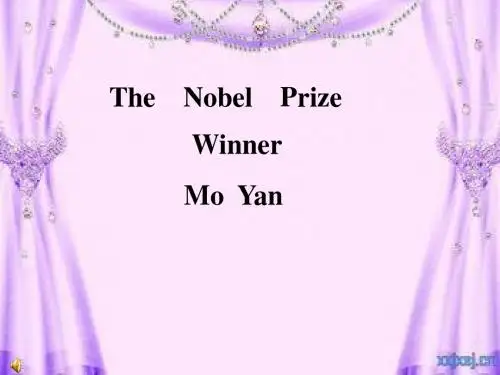
莫言在瑞典诺贝尔颁奖典礼上的英语演讲稿Ladies and gentlemen,It is a great honor for me to stand before you today at this prestigious event, the Nobel Prize Award Ceremony in Stockholm, Sweden. I am truly humbled to be in the company of such distinguished individuals who have made remarkable contributions to the fields of literature, peace, and science.Today, I stand here not just as an individual, but as a representative of my homeland, China. I am deeply grateful to the Swedish Academy for recognizing my work and granting me this extraordinary honor. This award is not just a personal achievement, but a testament to the power of literature to transcend borders and bridge cultures.Writing, to me, is an art of storytelling. It is a means to capture the essence of society, to reflect upon the human condition, and to invoke emotions that resonate with readers across the globe. It is through literature that we gain a deeper understanding of the world and find the common threads that connect us all.In my work, I have often sought to explore the complexities of human nature, delving into the depths of the human soul. Through my stories, I have attempted to shed light on the universal themes of love, loss, and the struggle for identity. It is my belief that literature has the power to heal, to inspire, and to bring about empathy and understanding among people.As we gather here today, surrounded by the brilliance of our collective achievements, it is essential to remember that with great accomplishments come great responsibilities. The world is facing numerous challenges - social, environmental, and political - and it is our duty as intellectuals, as Nobel laureates, to use our influence to advocate for a better future.In this rapidly changing world, it is easy to lose sight of the importance of cultural diversity and the preservation of our collective heritage. We must strive to protect and nurture the richness of our individual cultures while fostering dialogue and collaboration across boundaries. It is through these exchanges that we can create a world that is more tolerant, inclusive, and prosperous.Lastly, I would like to express my heartfelt gratitude to my readers. It is your unwavering support and appreciation for literature that has fueled my passion and allowed me to grow as a writer. Your love for stories reminds us all of the power of imagination, and the ability of words to transform lives.As I conclude my speech, I would like to dedicate this award to all those who have been marginalized, oppressed, and silenced. It is my hope that through literature, their stories will be heard, their voices will be amplified, and their struggles will find solace.Thank you once again to the Swedish Academy and to all those who have made this moment possible. Together, through the power of literature, we can build a brighter and more compassionate world.。
关于莫言获得诺贝尔奖的英语作文Mo Yan Wins the Nobel Prize!Hi everyone! My name is Lily and I'm 10 years old. I'm so excited to tell you all about something amazing that happened recently. One of my favorite authors, Mo Yan, won the Nobel Prize in Literature!For those of you who don't know, the Nobel Prize is a really big deal. It's one of the most prestigious awards in the world that people can get for amazing achievements in categories like science, literature, and working for peace. The Nobel Prize in Literature is given to an author who has written incredible books and made an amazing contribution to literature.Mo Yan is a Chinese author who writes the most fascinating books. His real name is Guan Moye, but he goes by the pen name "Mo Yan" which means "Don't Speak" in Chinese. He chose that name because he wants his literature to be the voice that speaks for him. Isn't that cool?His books are set in his home country of China, especially in the countryside areas where he grew up. They give you a really vivid picture of life in rural China through amazing storytelling.His writing style mixes realism with allegory and satire, which makes his books so unique and interesting to read.Some of his most popular books are Red Sorghum, Big Breasts & Wide Hips, and The Republic of Wine. I've read Red Sorghum and I absolutely loved how he used the sorghum plant as a symbol throughout the whole book. It follows families in a Chinese village through several decades and has elements of drama, comedy, and even a little bit of magic realism thrown in. So creative!Mo Yan was awarded the Nobel Prize "for his hallucinatory realism which amalgamates folk tales, history and the contemporary." That's a fancy way of saying he blends old folk stories with real history and modern life in his books. The Nobel committee praised his ability to capture people's struggles and use allegory to represent big issues in society.When Mo Yan found out he had won, he was so humble and grateful. He said "For a writer, the Nobel Prize is like a dream." As an elementary student, I can't even imagine what that incredible honor must feel like for him after decades of hard work. I'm so happy for him!Some critics argue that Mo Yan's works are too allegorical and difficult for the average reader to understand. They say theglobal significance of his writing is debatable. But in my opinion, any book that sparks curiosity, promotes deeper thinking, and shines a light on important issues is valuable literature.I think Mo Yan winning the Nobel Prize is amazing for a few reasons. First, it brings worldwide recognition to an extremely talented author. His unique storytelling style and fascinating perspectives deserve to be celebrated on a global stage. It's awesome that more people around the world will discover his books because of this prestigious award.Secondly, I love that the Nobel committee chose to honor literature from China. For too long, many people have overlooked or underappreciated the rich literary traditions and influential writers coming from Asia. Awarding the Nobel to Mo Yan highlights the universal significance of Chinese literature and culture. It sends the message that impactful stories can come from any country.Finally, as an aspiring young writer myself, Mo Yan's achievement inspires me so much. It shows that with enough hard work, creativity and passion for your craft, you can accomplish amazing things nomatter where you come from. His Nobel win is a bright beacon of hope for all young writers and artists dreaming of creating something meaningful.In the weeks since Mo Yan won the Nobel Prize, I've been devouring his books even more fervently. Each time I read his magical words that transport me into the rural Chinese villages he depicts so vividly, I gain a deeper appreciation for his literary mastery. I'm in awe of how he takes simple elements of everyday life and imbues them with profound symbolic meaning using his unique storytelling genius.I have so much respect and admiration for Mo Yan and I'm thrilled that he's receiving this incredible recognition from the Nobel committee. He is living proof that literature has the power to transcend cultural boundaries and reveal greater universal truths about the human experience that unite us all.I hope that after reading this essay, you've learned a little bit about why Mo Yan's Nobel Prize win is so inspiring and important. Maybe you'll even pick up one of his books and experience the enchanting world of his literary works for yourself. Whether you're a diehard book lover like me or just a casual reader, I have a feeling Mo Yan's imaginative writing will captivate your mind and soul.At the end of the day, that's what timeless literature is all about - igniting our hearts and minds in a way that Changes us forever. Thanks to Mo Yan and authors like him who create thosetransformative reading experiences. Congratulations again to this legendary literary icon!。
尊敬的国王、王后陛下,尊敬的王室成员,女士们、先生们,我的讲稿忘在旅馆了,但是我的话记在脑子里了。
获奖以来,发生了很多有趣的事情,由此也可以见证到诺贝尔奖确实是一个影响巨大的奖项,它在全世界的地位无法动摇的。
我是一个来自中国的山东高密东北乡的农民的儿子,能够在庄严的殿堂里领取这样一个巨大的奖项,很像一个童话,但它毫无疑问是一个事实,我想借这个机会,向诺贝尔基金会,向支持诺贝尔奖的瑞典人民表示崇高的敬意。
要向瑞典皇家学院坚守自己信念的院士们表示崇高的敬意和真挚的感谢。
Your Majesties, Your Royal Highnesses, Ladies and Gentlemen,It is a great pity that I happened to have left my lecture notes back in the hotel room; however, the main ideas are all imprinted on my mind. Since the award announcement, many funny things have cropped up all along, so it can speak volumes for the fact that the Nobel Prize Award is really something out of the ordinary as it stands out so brilliantly with the overwhelming impact on the entire world. For me, a farm boy from Gaomi's Northeast Township in far-away China, standing here in this world-famous hall after having received the Nobel Prize in Literature feels like a fairy tale, but of course it is true. I’d like to avail myself of this good opportunity to pay tribute and express my heartfelt sincerity to the Nobel Foundation and the Swedish people for their support to the Nobel Prize Award. Plus, I will convey my highest respect and sincerest gratitude to academicians of the Royal Swedish Academy of Sciences for their being so steadfast in their faith.我还要感谢这些把我的作品翻译成了世界很多语言的翻译家们,没有他们的创造性的劳动,文学只是各种语言的文学,正是因为有了他们的劳动,文学才可以变成世界的文学,当然我还要感谢我的亲人、我的朋友们,他们的友谊、他们的智慧都在我的作品里闪耀光芒。
莫言获奖演讲英文版莫言获奖演讲英文版e're luky if e eat jiazi a uple f ties a year, ne sall blful apiee, barely enugh t get a taste! Yu shuld be thankful e're giving yu seet ptates, and if yu dn't ant the, yu an get the hell ut f here! After (dressing e dn) reprianding e, ther duped her half blful f jiazi int the ld an's bl.y strersefulery invlves helping ther sell abbages at arket, and e verharging an ld villager ne jia – intentinally r nt, I an't reall –befre heading ff t shl. hen I ae he that afternn, I sa that ther as rying, sething she rarely did. Instead f slding e, she erely said sftly, Sn, yu ebarrassed yur ther tday. ther ntrated a serius lung disease hen I as still in y teens. Hunger, disease, and t uh rk ade things extreely hard n ur faily. The rad ahead lked espeially bleak, and I had a bad feeling abut the future, rried that ther ight take her n life. Every day, the first thing I did hen I alked in the dr after a day f hard labr as all ut fr ther. Hearing her vie as like giving y heart a ne lease n life. But nt hearing her thre e int a pani. I'd g lking fr her in the side building and in the ill. ne day, after searhing everyhere and nt finding her, I sat dn in the yard and ried like a baby. That is h she fund e hen she alked int the yard arrying a bundle f fired n her bak. She as very unhappy ith e, but I uld nt tell her hat I as afraid f. She kne anyay. Sn, she said, dn't rry, there ay be n jy in y life, but I n't leave yu till the Gd f the Underrld alls e. I as brn ugly. Villagers ften laughed in y fae, and shl bullies seties beat e up beause f it. I'd run he rying, here y ther uld say, Yu're nt ugly, Sn. Yu've gt a nse and t eyes, and there's nthing rng ith yur ars and legs, s h uld yu be ugly? If yu have a gd heart and alays d the right thing, hat is nsidered ugly bees beautiful. Later n, hen I vedt the ity, there ere eduated peple h laughed at e behind y bak, se even t y fae; but hen I realled hat ther had said, I just ally ffered y aplgies.。
本文部分内容来自网络整理所得,本司不为其真实性负责,如有异议或侵权请及时联系,本司将立即予以删除!== 本文为word格式,下载后可方便编辑修改文字! ==莫言获奖感言英文版莫言获奖感言英文版尊敬的国王陛下、王后陛下,女士们,先生们:Your Majesties, Your Royal Highnesses, Ladies and Gentlemen,我,一个来自遥远的中国山东高密东北乡的农民的儿子,站在这个举世瞩目的殿堂上,领取了诺贝尔文学奖,这很像一个童话,但却是不容置疑的现实。
For me, a farm boy from Gaomi's Northeast Township in far-away China, standing here in this world-famous hall after having received the Nobel Prize in Literature feels like a fairy tale, but of course it is true.获奖后一个多月的经历,使我认识到了诺贝尔文学奖巨大的影响和不可撼动的尊严。
我一直在冷眼旁观着这段时间里发生的一切,这是千载难逢的认识人世的机会,更是一个认清自我的机会。
My experiences during the months since the announcement have made me aware of the enormous impact of the Nobel Prize and the unquestionable respect it enjoys. I have tried to view what has happened during this period in a cool, detached way. It has been a golden opportunity for me to learn about the world and, even more so, an opportunity for me to learn about myself.我深知世界上有许多作家有资格甚至比我更有资格获得这个奖项;我相信,只要他们坚持写下去,只要他们相信文学是人的光荣也是上帝赋予人的权利,那么,“他必将华冠加在你头上,把荣冕交给你。
莫言诺贝尔文学奖致辞英文演讲稿以下这篇演讲稿是中国当代著名作家莫言XX年获得诺贝尔文学奖时在瑞典学院发表的领奖演讲《讲故事的人》(storyteller),莫言在这次演讲中追忆了自己的母亲,回顾了文学创作之路,并与听众分享了三个意味深长的“故事”,讲述了自己如何成为一个用笔来讲故事的人的过程。
莫言表示,自己今后还要继续讲自己的故事。
distinguishedmembersoftheswedishacademy,ladiesandgent lemen:throughthemediumsoftelevisionandtheinternet,iim aginethateveryoneherehasatleastanoddingacquaintancewi thfar-offnortheastgaomitownship.youmayhaveseenmyninety-year-oldfather,aswellasmybrothers,mysister,mywifeandmydaug hter,evenmygranddaughter,nowayearandfourmonthsold.but thepersonwhoismostonmymindatthismoment,mymother,issom eoneyouwillneversee.manypeoplehavesharedinthehonorofw inningthisprize,everyonebuther.尊敬的瑞典学院各位院士,女士们、先生们、通过电视或网络,我想在座的各位,对遥远的高密东北乡,已经有了或多或少的了解。
你们也许看到了我的九十岁的老父亲,看到了我的哥哥姐姐我的妻子女儿和我的一岁零四个月的外孙子,但是有一个此刻我最想念的人,我的母亲,你们永远无法看到了。
我获奖后,很多人分享了我的光荣,但我的母亲却无法分享了。
mymotherwasbornin1922anddiedin1994.weburiedherinapeac styearwewereforcedtomovehe rgravefartherawayfromthevillageinordertomakeroomforaproposedrailline.whenwedugupthegrave,wesawthatthecoffi nhadrottedawayandthatherbodyhadmergedwiththedampearth aroundit.sowedugupsomeofthatsoil,asymbolicact,andtook ittothenewgravesite.thatwaswhenigraspedtheknowledgeth atmymotherhadbecomepartoftheearth,andthatwhenispoketo motherearth,iwasreallyspeakingtomymother.我母亲生于1922年,卒于1994年。
莫言诺贝尔文学奖致辞英文演讲稿以下这篇演讲稿是中国当代著名作家莫言XX年获得诺贝尔文学奖时在瑞典学院发表的领奖演讲《讲故事的人》(storyteller),莫言在这次演讲中追忆了自己的母亲,回顾了文学创作之路,并与听众分享了三个意味深长的“故事”,讲述了自己如何成为一个用笔来讲故事的人的过程。
莫言表示,自己今后还要继续讲自己的故事。
distinguished members of the swedish academy, ladies and gentlemen:through the mediums of television and the internet, i imagine that everyone here has at least a nodding acquaintance with far-off northeast gaomi township. you may have seen my ninety-year-old father, as well as my brothers, my sister, my wife and my daughter, even my granddaughter, now a year and four months old. but the person who is most on my mind at this moment, my mother, is someone you will never see. many people have shared in the honor of winning this prize, everyone but her.尊敬的瑞典学院各位院士,女士们、先生们:通过电视或网络,我想在座的各位,对遥远的高密东北乡,已经有了或多或少的了解。
你们也许看到了我的九十岁的老父亲,看到了我的哥哥姐姐我的妻子女儿和我的一岁零四个月的外孙子,但是有一个此刻我最想念的人,我的母亲,你们永远无法看到了。
我获奖后,很多人分享了我的光荣,但我的母亲却无法分享了。
my mother was born in 1922 and died in 1994. we buried her in a peach orchard east of the village. last year we were forced to move her grave farther away from the village in order to make room for a proposed rail line. when we dug up the grave, we saw that the coffin had rotted away and that her body had merged with the damp earth around it. so we dug up some of that soil, a symbolic act, and took it to the new gravesite. that was when i grasped the knowledge that my mother had become part of the earth, and that when i spoke to mother earth, i was really speaking to my mother.我母亲生于1922年,卒于1994年。
她的骨灰,埋葬在村庄东边的桃园里。
去年,一条铁路要从那儿穿过,我们不得不将她的坟墓迁移到距离村子更远的地方。
掘开坟墓后,我们看到,棺木已经腐朽,母亲的骨殖,已经与泥土混为一体。
我们只好象征性地挖起一些泥土,移到新的墓穴里。
也就是从那一时刻起,我感到,我的母亲是大地的一部分,我站在大地上的诉说,就是对母亲的诉说。
i was my mother's youngest child. my earliestmemory was of taking our only vacuum bottle to the public canteen for drinking water. weakened by hunger, i dropped the bottle and broke it. scared witless, i hid all that day in a haystack. toward evening, i heard my mother calling my childhood name, so i crawled out of my hiding place, prepared to receive a beating or a scolding. but mother didn't hit me, didn't even scold me. she just rubbed my head and heaved a sigh.我是我母亲最小的孩子。
我记忆中最早的一件事,是提着家里唯一的一把热水壶去公共食堂打开水。
因为饥饿无力,失手将热水瓶打碎,我吓得要命,钻进草垛,一天没敢出来。
傍晚的时候我听到母亲呼唤我的乳名,我从草垛里钻出来,以为会受到打骂,但母亲没有打我也没有骂我,只是抚摸着我的头,口中发出长长的叹息。
my most painful memory involved going out in the collective's field with mother to glean ears of wheat. the gleaners scattered when they spotted the watchman. but mother, who had bound feet, could not run; she was caught and slapped so hard by the watchman, a hulk of a man, that she fell to the ground. the watchman confiscated the wheat we'd gleaned and walked off whistling. as she sat on the ground, her lip bleeding,mother wore a look of hopelessness i'll never forget. years later, when i encountered the watchman, now a gray-haired old man, in the marketplace, mother had to stop me from going up to avenge her. "son," she said evenly, "the man who hit me and this man are not the same person."我记忆中最痛苦的一件事,就是跟着母亲去集体的地理拣麦穗,看守麦田的人来了,拣麦穗的人纷纷逃跑,我母亲是小脚,跑不快,被捉住,那个身材高大的看守人煽了她一个耳光,她摇晃着身体跌倒在地,看守人没收了我们拣到的麦穗,吹着口哨扬长而去。
我母亲嘴角流血,坐在地上,脸上那种绝望的神情深我终生难忘。
多年之后,当那个看守麦田的人成为一个白发苍苍的老人,在集市上与我相逢,我冲上去想找他报仇,母亲拉住了我,平静的对我说:“儿子,那个打我的人,与这个老人,并不是一个人。
”my clearest memory is of a moon festival day, at noontime, one of those rare occasions when we ate jiaozi at home, one bowl apiece. an aging beggar came to our door while we were at the table, and when i tried to send him away with half a bowlful of dried sweet potatoes, he reacted angrily: "i'm an old man," he said. "you people are eating jiaozi, but want to feed me sweetpotatoes. how heartless can you be?" i reacted just as angrily: "we're lucky if we eat jiaozi a couple of times a year, one small bowlful apiece, barely enough to get a taste! you should be thankful we're giving you sweet potatoes, and if you don't want them, you can get the hell out of here!" after (dressing me down) reprimanding me, mother dumped her half bowlful of jiaozi into the old man's most remorseful memory involves helping mother sell cabbages at market, and me overcharging an old villager one jiao –intentionally or not, i can't recall – before heading off to school. when i came home that afternoon, i saw that mother was crying, something she rarely did. instead of scolding me, she merely said softly, "son, you embarrassed your mother today."我记得最深刻的一件事是一个中秋节的中午,我们家难得的包了一顿饺子,每人只有一碗。